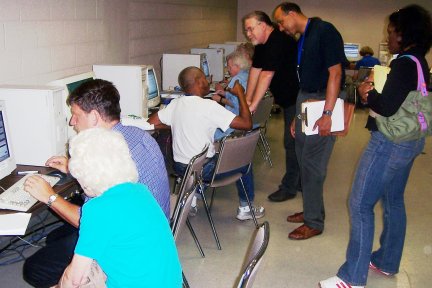IS THIS ALL THERE IS? The mayoral primary is twelve days away. The field of eight will turn into a field of two, most likely Jackson vs. Campbell or Jackson vs. Draper. Jackson vs.
somebody, anyway. And then we'll have another month to figure out which of the two would be a better Mayor.
I've now personally sat and talked with five of the eight in
Meet The Bloggers interviews. They're all smart, engaging people. They all have websites and position papers, which I've read, and issue raps, which I've heard. Likewise for the incumbent Mayor, who now plans to Meet the Bloggers next Tuesday.
I haven't actually decided who to vote for yet, but I
have come to a conclusion. I've concluded that we in Cleveland have ringside seats for the slow, sloppy death of the Democratic Party.
Think about it: Here are seven Democrats and one just-barely-Republican running for the highest office in the biggest, most Democratic city of the biggest, most Democratic county in Ohio. The city in question is, we all agree, in terrible trouble: poverty-ridden, shrinking, undereducated, losing industry and commerce, physically shabby, fraught with outright crime, public disorder and general weirdness. For a couple of minutes there we were The Poorest City In The Country. But we're still a big city with a diverse economy, an important hub of African-American politics, a center of the arts, medicine and banking, a Sports Town -- surrounded by a region that's generally still pretty healthy, still slowly adding jobs, still one of the nation's biggest metropolitan markets, and still pretty Democratic as well.
Do Democrats,
as a party, have any real ideas for rebuilding troubled cities, empowering neighborhoods, protecting consumers and public health, getting everybody educated, encouraging 21st-century enterprises without reverting to 19th-century labor relations? If so, Cleveland, Ohio would seem to be just about the best place in the country for the party to roll them out.
So what are the candidates talking to us about? Casinos. A convention center. Downtown housing. Merging EMS and Fire. Reducing Council. The residency requirement. Speeder-catching cameras. Fighting poverty with Walmart jobs. Who should hire the new schools boss. Lots of platitudes about "world-class" this and "business-friendly" that and "regional" yadayada. Occasionally a few words about technology or alternative energy, but that's for the geeks and suits.
I'm sorry, people. I'm not singling anybody out here -- I'm a Democrat who's just as responsible for this as anyone else -- but am I the only one who thinks this is pathetic?
Is this all there is?The last great Democratic urban strategy was the Community Reinvestment Act, passed nearly thirty years ago in a charge led by Senator William Proxmire, who channeled the ideas of thousands of neighborhood organizers and leaders of the great anti-redlining campaigns of the mid-'70s. The CRA (and its companion, the Home Mortgage Disclosure Act) brilliantly leveraged the existing structure of bank regulation to create negotiating power for neighborhoods and cities vis-a-vis the banking and thrift industries. At virtually no cost to any public treasury, the CRA changed the culture of urban banking, made community lending and inner-city branch management a desirable career path, and forced bank executives to learn that inner cities are a profitable market. It has moved literally billions of dollars into neighborhoods that were written off as "unbankable" in the '60s and '70s. The whole familiar structure of neighborhood development in Cleveland and similar cities -- the ubiquitous CDCs, the new home clusters, the commercial strips, the rehab loan programs -- is a child of the CRA.
Where's the next CRA? What's the Democrats' next big Urban Idea? Casinos? Joint municipal salt purchasing?
Wal-Mart?
I don't know either, but here's a clue: Like the CRA, it's going to come from the bottom of the food chain, not the top. Like the CRA, its going to be about something vitally important to ordinary people's lives. And like the CRA, it's going to be about
power -- about city people's ability to be effective players, rather than pawns, in our communities' futures.
In other words, it won't be like anything under discussion in this year's mayor's race in Democratic Cleveland.
Maybe next time.
